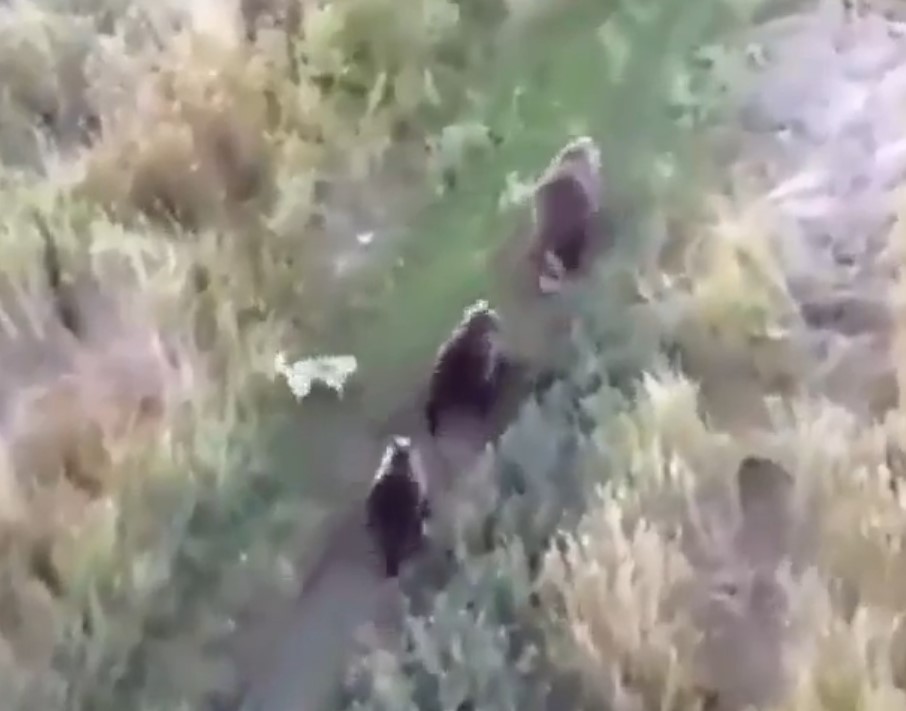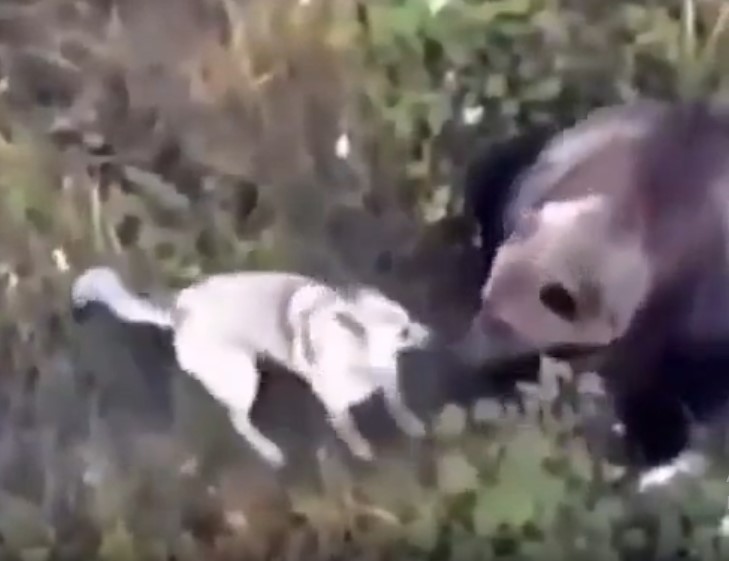It is not said for nothing that a dog is a man’s best friend. The bond between the canine and his favourite human is one of the strongest in the world, and the pain felt when it is suddenly disrupted can not be described in words.
That is exactly how one couple felt when they lost sight of their beloved Husky one day. They couldn’t find him anywhere, so in despair, they began to suspect the worst.
Yet, these people were determined to do everything to find their pet, so they even decided to use their drone in order to locate him. This sophisticated device brought a smile back to their faces when they saw their dog on the monitor.
However, at the same time, the scene captured by the drone replaced that happiness with shock and disbelief.
In Good Company

A video recorded by the mentioned drone was posted on Instagram by the user, @sailorjerrithedogtrainer. The very title of the video reveals why the pet parents’ happiness suddenly turned into shock when they took a closer look at the monitor.
“Owners were using a drone to find their missing husky. He was chillin’ with wild bears,” the Instagram user who posted the video wrote.
Yes, you heard that right – this adventurous pup decided to choose the company of none other than a pack of big, wild bears. Although many people find the scenes of two different types of animals hanging out together cute, it is somewhat different when it comes to bears.
Not all bears are aggressive, but when you see three wild bears running around your beloved pet, you surely cannot stay indifferent. To make matters worse, the video shows several situations that are on the verge of escalation between the dog and one of the bears.

Fortunately, by the end of the video, the bears can be seen patiently tolerating the Husky despite being visibly annoyed by his presence. Despite the tension until the very end, this fact still makes the video funny and cute – at least for the neutral viewers.
We won’t delve much into the parents’ emotions, though.
Hillarious Comments
This video attracted a lot of attention when it was published on Instagram. It is not a surprise since you do not see a bunch of bears hanging around with a little Husky every day.
There were many different reactions, and a lot of funny ones, almost hilarious, so we highlighted some of them.
“You just know this husky has major Donkey from Shrek vibes.” one user wrote.
“Ask your mom if I can sleep over!😂” another user joked.
And, the third quipped: “Bears are like HIS FUR IS ON EVERYTHING”
We don’t know how his parents got to him, but we do know how this Husky got to the hearts of many people and showed that animals know no boundaries when it comes to love and friendship.
We will conclude that the bears demonstrated this by refraining from causing him serious injury. 😂
If you’ve ever caught your furry friend munching on cat poop, you’re not alone in this perplexing situation. Dogs engaging in this less-than-appetizing behavior can leave you scratching your head in confusion. As a seasoned dog trainer, I’ve encountered countless pet parents bewildered by their dog’s questionable snack choices. Understanding the reasons behind this peculiar habit is key to addressing it effectively.
Curiosity, nutritional deficiencies, or simply finding the scent irresistible could be driving your dog’s fascination with cat poop. While it may seem gross to us, to your dog, it might be an intriguing delicacy. Unraveling the mystery behind why dogs indulge in this behavior can shed light on their instincts and preferences. Let’s dive deeper into this curious canine behavior to uncover the motivations behind your dog’s unusual culinary preferences.
Understanding the Canine Fascination with Cat Poop
The Instinctual Attraction to Feces
Dogs have a natural inclination towards exploring scents, including those we find repulsive. This behavior stems from their ancestral instincts to hunt and scavenge for food. Feces, especially from cats, can be enticing to dogs due to the strong odors that trigger their curiosity. To your dog, the smell of cat poop might signal a potential food source or prey, making it hard for them to resist the urge to investigate or consume it.
Nutritional Implications: Is There Any Benefit?
While it may seem gross to us, there could be a nutritional motivation behind your dog’s curious habit. Cat feces may contain undigested nutrients that could be appealing to your dog. Some dogs might be drawn to cat poop as a way to supplement their diet with missing nutrients. However, this behavior can pose health risks like the transmission of parasites or bacteria, so it’s essential to discourage it and ensure your dog’s diet is balanced and nutritious.
Health Risks Associated with Dogs Eating Cat Poop
Parasites and Bacterial Infections
Eating cat feces can expose your dog to a range of parasites like Toxoplasma gondii and bacteria like E. coli. These microscopic organisms can lead to serious health issues in your furry friend, such as gastrointestinal upset, diarrhea, vomiting, and in severe cases, even organ damage. It is essential to prevent your dog from consuming cat feces to avoid these harmful infections.
Potential for Toxicity from Cat Medications
Cat medications, especially those for deworming or treating illnesses, can be present in the feces your dog consumes. These medications are formulated for cats and can be toxic to dogs. Ingesting cat medications can result in poisoning in dogs, leading to symptoms like lethargy, drooling, tremors, and in worst cases, seizures. Always monitor your dog to prevent them from ingesting cat poop contaminated with medications to safeguard their health.
Behavioral Aspects: Why Dogs Choose Cat Poop Over Other Foods
Scavenging Habits and Opportunistic Feeding
Dogs’ scavenging habits and opportunistic nature play a role in their attraction to cat poop. Their instinct to scavenge for resources stems from their ancestors’ survival tactics. As scavengers, dogs are naturally drawn to unfamiliar scents and textures, making cat feces a curious and appealing find. This behavior is ingrained in their DNA, leading them to explore and consume items that may seem unpalatable to us but hold intrigue for them.
Boredom and Anxiety-Related Behaviors
Boredom and anxiety can also drive dogs to eat cat poop. Just like humans may indulge in mindless snacking when bored or stressed, dogs may turn to unusual sources of food out of anxiety or sheer boredom. Eating cat feces could provide a temporary distraction or relief from these emotional states. It’s essential to address any underlying boredom or anxiety issues through regular exercise, mental stimulation, and a stress-free environment to discourage this behavior in your furry companion.
Preventive Measures to Stop Your Dog from Eating Cat Poop
Keeping the Litter Box Clean and Out of Reach
To prevent your dog from snacking on cat poop, ensure the litter box is clean and placed out of your dog’s reach. Cats like privacy, so the litter box may be in a secluded spot. You can use baby gates or elevated platforms to keep it inaccessible to your dog.
Training and Environmental Enrichment Strategies
Training your dog is essential to break the habit of eating cat poop. Use positive reinforcement techniques like treats or toys to redirect their attention. Provide mental stimulation through interactive toys and regular exercise to keep your dog entertained and less likely to seek out the litter box. Consistency in training is key to successfully deter this behavior and ensure your dog’s well-being.
Professional Advice on Managing Coprophagia in Dogs
When to Consult a Veterinarian
If you notice that your dog’s poop-eating behavior persists despite your efforts to curb it, or if it’s causing health issues, it’s time to consult a veterinarian. They can rule out any underlying medical conditions causing this behavior and provide tailored advice to help manage it effectively.
The Role of Behaviorists and Professional Trainers
Behaviorists and professional trainers can offer valuable insights into addressing your dog’s coprophagia. They can help you understand the root cause of this behavior and provide targeted training techniques to modify it. Seeking professional help can significantly improve your dog’s behavior and overall well-being.
Conclusion
So, there you have it! Your furry friend’s fascination with cat poop might be rooted in their instincts and the allure of potential nutrients. Remember, it’s essential to address this behavior to avoid health risks. By maintaining a clean litter box, providing mental stimulation, and seeking professional guidance if needed, you can help your dog overcome this habit. Stay consistent in your training efforts and show them love and patience along the way. Your pup’s well-being is a top priority, so don’t hesitate to reach out to a vet or behaviorist for tailored advice. Together, you can tackle this issue and ensure your dog leads a happy and healthy life.
Frequently Asked Questions
Why do dogs eat cat feces?
Dogs are attracted to cat feces due to ancestral instincts, potential nutritional benefits, and scavenging behavior.
What are the health risks of dogs consuming cat feces?
Health risks include exposure to parasites, bacteria, and toxins present in cat feces, which can lead to gastrointestinal issues and infections in dogs.
How can I prevent my dog from eating cat feces?
Preventive measures include keeping the litter box clean and inaccessible, providing mental stimulation and exercise for your dog, and training with positive reinforcement techniques.
When should I consult a veterinarian about my dog’s behavior?
Consult a vet if the behavior persists or causes health problems. They can identify underlying medical conditions and provide tailored advice.
What professionals can help address my dog’s coprophagia behavior?
Behaviorists and professional trainers can assist in understanding the root cause of coprophagia and implementing effective training techniques for your dog’s well-being.
[no_toc]

Hey there, I’m Janet Brooks, a dog-loving student from California. I’m all about helping pups in need, especially those without homes. Me and my awesome friends work together to give shelter and love to stray dogs. Oh, and I also write blogs about dogs to share helpful info.